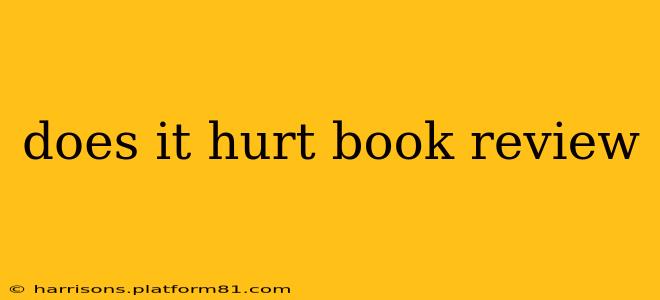Does it Hurt? Navigating the World of Negative Book Reviews
Writing a book is a deeply personal endeavor, a journey of creation and vulnerability. Sharing that creation with the world, however, opens it up to criticism – and sometimes, harsh criticism. The question, "Does it hurt to get a negative book review?" is a resounding yes for many authors, but the impact varies greatly depending on several factors. Let's delve into this sensitive topic.
Does a Negative Book Review Affect Sales?
This is a question many authors grapple with. While a single negative review likely won't significantly impact sales, a consistent stream of scathing critiques can affect a book's visibility and potential readership. However, it's crucial to remember that the algorithm of major online retailers doesn't solely rely on reviews. Strong marketing, positive word-of-mouth, and overall book quality still play a significant role in sales success.
How Do Authors Typically React to Negative Reviews?
Reactions range from mild disappointment to profound hurt and anger. Some authors are able to detach emotionally, viewing criticism as constructive feedback, while others find even the most politely worded critiques deeply upsetting. The emotional investment in a book is immense, making negative feedback feel like a personal attack on their creativity and hard work.
What Should Authors Do When They Receive Negative Reviews?
The best approach is often a blend of professional detachment and self-compassion. Here’s a suggested course of action:
- Take a break: Don't immediately react. Stepping away for a while allows for a more objective perspective.
- Identify constructive criticism: Are there recurring themes in negative reviews? Could these point to areas for improvement in future writing?
- Respond thoughtfully (optional): A professional, polite response acknowledging the reader's perspective can sometimes diffuse negativity. However, it's crucial to avoid getting into arguments or engaging in personal attacks.
- Focus on the positive: Remind yourself of the positive reviews and feedback you’ve received. Celebrate your accomplishments and the positive aspects of your book.
- Seek support: Talk to fellow authors, writing groups, or mentors about your experience. Sharing your feelings can alleviate stress and provide valuable perspective.
Can Negative Reviews Be Beneficial?
Surprisingly, yes! While painful, negative reviews can offer valuable insights. They might highlight flaws in the writing, plot, or character development that the author hadn’t noticed. This feedback can be invaluable for future projects, leading to improved storytelling and a better overall reading experience. Viewing negative reviews as opportunities for growth can transform a potentially damaging experience into a positive learning one.
How Can Authors Build Resilience Against Negative Criticism?
Building resilience is a crucial skill for authors. Here are some strategies:
- Develop a thick skin: Accept that not everyone will love your work. Embrace diverse opinions and understand that negative feedback isn’t a reflection of your worth as a person or writer.
- Focus on your craft: Continue honing your skills. The more confident you are in your writing abilities, the less likely you are to be deeply affected by negative reviews.
- Remember your purpose: Why did you write this book? Reconnect with your initial motivations and remember that the act of creation itself is a valuable accomplishment.
In conclusion, negative book reviews can be painful, but they don't have to define an author's career or self-worth. By adopting a balanced approach—combining resilience, constructive feedback analysis, and self-compassion—authors can navigate the challenges of negative reviews and emerge stronger and more experienced.
